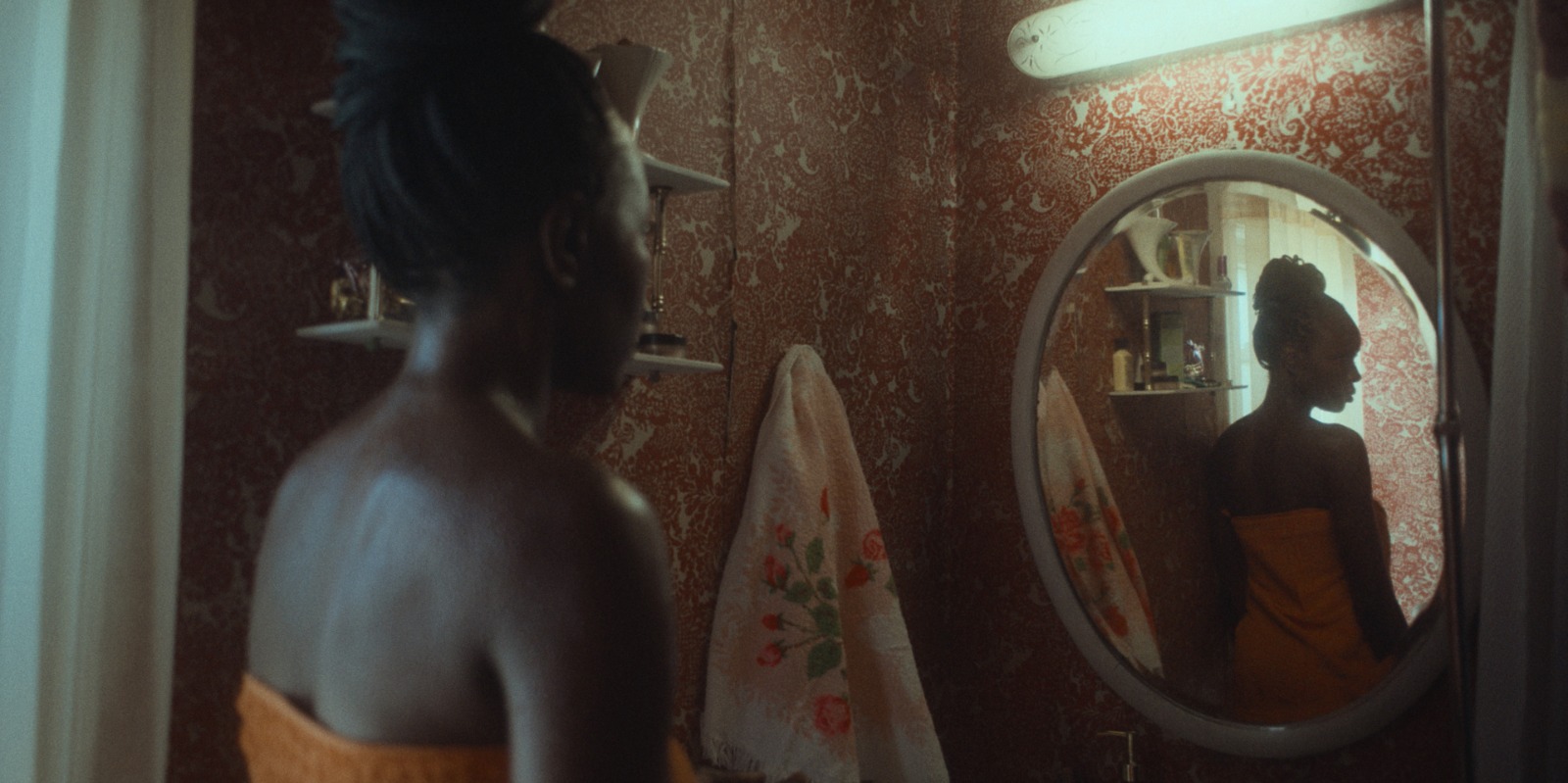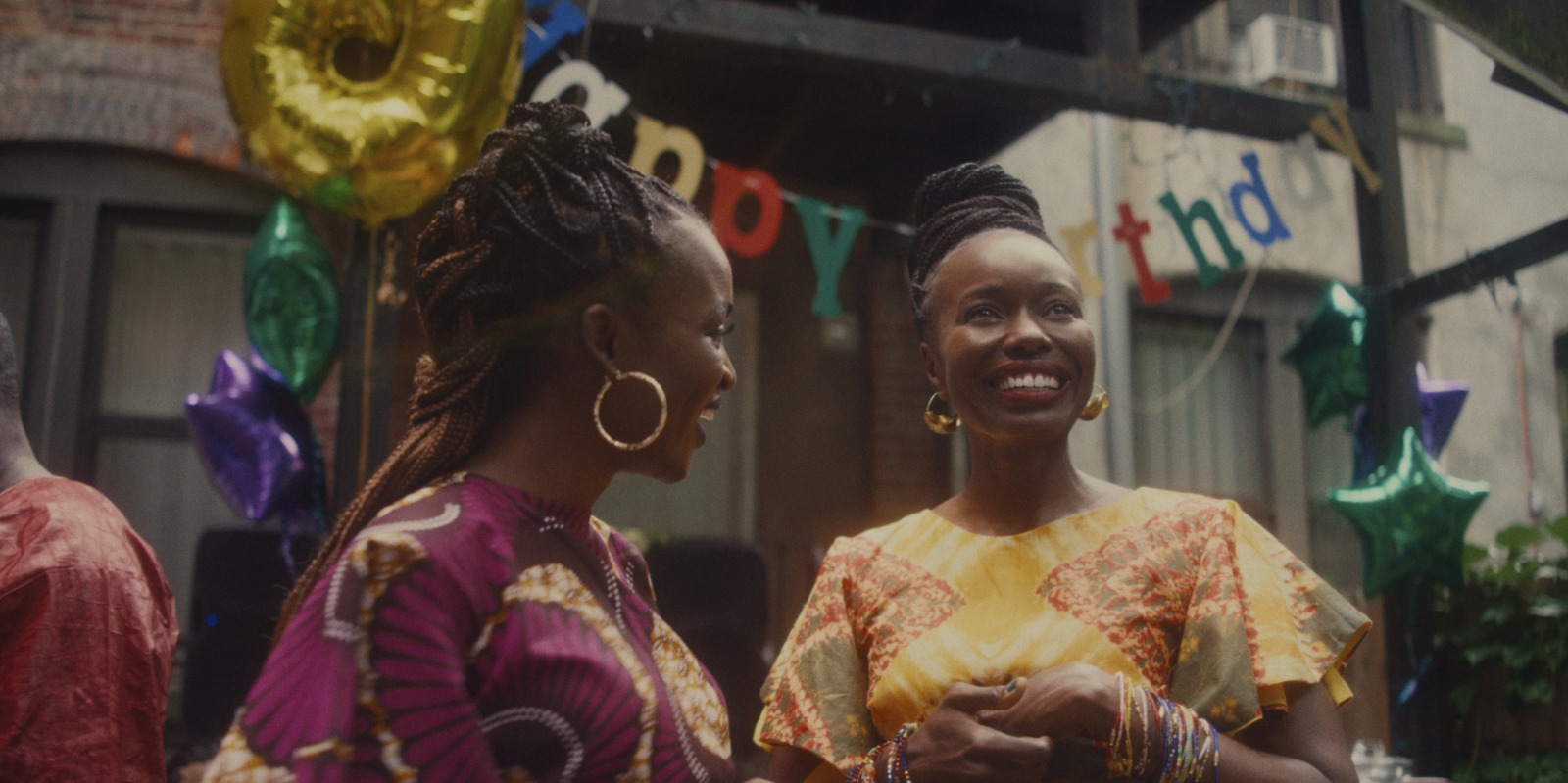MATTEA CARBERRY reviews NANNY by NIKYATU JUSU.
Nanny (2022), directed by Nikyatu Jusu, has shone bright at this year’s London Film Festival. It was the film I was most looking forward to seeing, and it did not disappoint.
The film follows Aisha (Anna Diop) who has left her son in Senegal to come to America, in hopes of establishing a new life for her family. There, she finds work as a nanny for a wealthy white family in New York City’s Upper East Side. Over the course of the film, we see racial power structures play out in the dynamic between her and the family. We also see the long hours and hard work she puts into her job, all while diligently trying to stay connected to her son back in Senegal. Importantly, Jusu also doesn’t let the implications of gender and economic status go unnoticed either.
Through this story, Jusu presents a pertinent social commentary on the reality of what it means to be an immigrant woman of colour in America, pursuing the elusive American Dream. Her bending of genre and a fluid exchange between the natural and supernatural beautifully amplifies these points, adding further colour and depth to how we interpret the film as a whole.
The film’s natural flow carried its events; dramatic moments were naturally built, escaping any showy flashes of performance. For instance, the long takes, particularly in scenes between Aisha and Amy (Michelle Monaghan), perfectly captured the uncomfortable tension between them, illustrating how racial power dynamics are felt even in silence.
The plot is objectively repetitive, as the audience watches Aisha bounce back and forth from nannying in the family’s big, fancy flat to being at home trying to call her son, who is multiple time zones away.

However, it is in this repetition of her quotidien routine that we notice the implication of small details which, I think, are often more significant than the creation of dramatic key events. We see the countless hours Aisha puts into working: all so that she can make the money to fly her son to New York, to be with her once and for all.. We see Rose, the child she nannies, grow fond of her and become influenced by Aisha, from learning French to eating the West African food she cooks. But we also see how Rose’s parents subtly and not-so-subtly objectify Aisha, otherize her culture, try to pay her less than she is owed, and remain complicit in the oppression she faces as a Black immigrant woman in America.
Most importantly of all, we see Aisha’s strength. Despite consistently being otherized and belittled, she refuses to let these obstacles kill her spirit. She often stands her ground with composed dignity. This behaviour is, in many ways, reminiscent of Diouana in Ousmane Sembène’s Black Girl (1966), and there are other commonalities between the two films.
The story doesn’t end there. While most of the film follows a realistic day-to-day pacing, elements of suspense and West African folklore are interwoven into the film as well. Such supernatural scenes add another element of vividness to an already amazing story, providing more imagery through which to funnel our interpretation of the film.
Most prominent is the motif of water. Whether in her nightmares or reality, water infiltrates her space, sometimes threatening to consume her or otherwise unnerving her by its sheer vastness. There are also a few strong associations between water and folkloric allusions. Hence, the agent of water uncovers a wide range of interpretations embedded in the film, such as the parallel between the suffocating sensation of drowning and that of being a toiling immigrant, as well as Aisha’s relationship with water representing a supernatural connection with the folklore from her homeland.
Thus, Nanny is characterised by a seamless blend of drama and social horror, making for a gripping watch. And it is such fluidity in structure and form that, in my opinion, particularly compels the viewer to think critically about the events occurring in Aisha’s ‘real’ life. We are forced to grapple with how Aisha’s nightmares and visions affect how we receive the more composed, subtle moments of the film.
For me, the overall effect that such vivid imagery achieves is expressing the amalgamation of Aisha’s inner turmoil that comes with the stress of moving to a new country and being separated from her son. Her vivid nightmares and visions are certainly the most suspenseful and visually captivating, standing in stark contrast to her often composed exterior she presents, particularly with her employers. Thus, these bold moments serve to illustrate that these ‘small’ moments of degradation and frustration are not as minute as Aisha may outwardly project. Rather, Jusu creatively expresses the raw human emotion that is warring inside Aisha the whole time, and that is precisely what makes this film so special and wonderfully honest.
The reason I was so excited for this film was because it dealt with an American immigrant story: not just any immigrant story, but the immigrant story of a person of colour, an experience that remains unrepresented in art and general discourse. America has always been marketed as a land of endless opportunities, leading people to aspire towards the so-called American Dream. That’s not to say opportunities do not exist, but the immense toil it actually takes on immigrants, especially immigrants of colour, is often downplayed or straight-up unacknowledged in the public eye.

Like the film’s lead, my grandparents themselves came to America from South Korea for the same hope of better prospects. For their whole lives they worked until they died, and there was nothing overly glamorous about it. It’s hard work. It is through their children (my mom) and grandchildren that the effects of their efforts are truly appreciated and felt. But importantly, that is the primary reason many parents immigrate to America – for their children and their children’s children.
Jusu captured this truth beautifully. Aisha was not simply going through all this hard, thankless work for herself. She was doing it for her son, whom she was willing to move away from – all so that he could be happier in the future. Thus, this film also illustrates the close relationship between the immigrant identity and motherhood.
With strong performances from Diop and Monaghan, and a brilliant story from Jusu, this film presents a fresh, humble interpretation of what it means to be an immigrant of colour in America that is too important to ignore.
Featured image courtesy of Screen Daily





